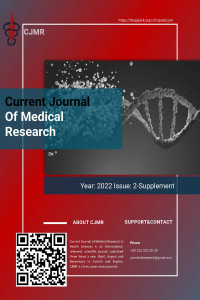Abstract
Amaç: Kolorektal kanser tanısı almış hastalarda tarama programlarıyla tanı konulma oranını araştırmak, kişisel ve çevresel risk faktörlerinin kolorektal kanser gelişimine etkisini ve kolorektal kanser tarama programları farkındalıklarını incelemek amaçlanmıştır.
Gereç ve Yöntemler: Çalışmaya İKÇÜ Atatürk Eğitim Araştırma Hastanesi Tıbbi Onkoloji polikliniğinde, kolorektal karsinom tanısı almış, tedavi ve kontrol amaçlı başvuran 50 yaş üstü hastalar dahil edilmiştir. Hastalara tarama programları hakkındaki bilgilerini ve risk faktörlerini değerlendirmeye yönelik 14 sorudan oluşan anket yöneltilmiştir. Klinik-demografik veriler tıbbi onkoloji poliklinik dosya kayıtlarından elde edilmiştir.
Bulgular: Çalışmaya 130 kişi dahil edilmiştir. Taramayla tanı alan 23, taramayla tanı almayan 107 kişi saptanmıştır. Tarama ile tanı alanların yaş ortalaması 58,6, taramayla tanı almayanların yaş ortalaması 63,6 olup taramayla tanı alan hastalar daha erken yaşta tanı almıştır. Hastaların %2,4’ü T1, %3,5’i T2, %47,1’i T3 ve %47,1’i T4 evresinde tanı almıştır. Tarama ile tanı alan hastaların T evresi tarama ile tanı almayan hastalara göre düşük saptanmıştır. Tanı sırasında metastaz saptanan 58 kişiden 8’i taramayla tanı alan gruptadır. Hastaların %79,2’sinin KETEM hakkında bilgisi olmadığı saptanmıştır. KETEM hakkında bilgi sahibi olanların %56,5’i taramayla tanı almış, %13,1’i tarama programına katılmadan tanı almıştır. KETEM hakkında bilgi sahibi olmanın, tarama ile tanı almayla anlamlı bir ilişkisi olduğu bulunmuştur. Çalışmaya katılanların tarama programıyla tanı konulma oranı %17,6’dır.
Sonuç: Bu çalışmada taramayla tanı almış hastaların daha erken yaşta, daha düşük T evresinde tanı aldıkları ve KETEM hakkında bilgisi olanların tarama programına katılımlarının daha yüksek olduğu saptanmıştır. Kolorektal kanserin daha erken evrede tespiti ve mortalitesinin azaltılması için tarama programlarına katılım çok önemlidir. Tarama programları hakkında toplumun bilinçlendirilmesi ve bilgi düzeylerinin arttırılması için çalışmalar yapılması gerekmektedir.
Abstract
Objective: It was aimed to investigate the rate of diagnosis with screening programs in patients diagnosed with colorectal cancer, to examine the effects of personal and environmental risk factors on the development of colorectal cancer, and to examine the awareness of colorectal cancer screening programs.
Material and Methods: Patients over 50 years of age who were diagnosed with colorectal carcinoma in the Medical Oncology outpatient clinic of IKCU Atatürk Training and Research Hospital and applied for treatment and control purposes were included in the study. A questionnaire consisting of 14 questions was directed to the patients to evaluate their knowledge about screening programs and risk factors. Clinical-demographic data were obtained from medical oncology outpatient clinic file records.
Results: 130 people were included in the study. 23 people diagnosed by screening and 107 people who were not diagnosed by screening were identified. The mean age of those diagnosed by screening was 58.6 years and those who were not diagnosed by screening were 63.6 years old. Patients who were diagnosed by screening were diagnosed at an earlier age. 2.4% of the patients were diagnosed at T1, 3.5% at T2, 47.1% at T3 and 47.1% at the T4 stage. The T stage of the patients diagnosed by screening was found to be lower than the patients not diagnosed by screening. Of the 58 people who were found to have metastases at the time of diagnosis, 8 were in the group diagnosed by screening. It was determined that 79.2% of the patients did not know about KETEM. Of those who knew about KETEM, 56.5% were diagnosed with screening, and 13.1% were diagnosed without participating in the screening program. It has been found that knowing about KETEM has a significant relationship with being diagnosed through the screening program. The rate of being diagnosed with the screening program of the participants in the study was 17.6%.
Conclusion: In this study, it was determined that patients diagnosed by screening were diagnosed at an earlier age, at a lower T stage and those who had knowledge about KETEM were more likely to participate in the screening program. Participation in screening programs is very important for detecting colorectal cancer at an earlier stage and reducing its mortality. It is necessary to carry out studies to raise awareness of society about screening programs and to increase their level of knowledge.
Details
| Primary Language | Turkish |
|---|---|
| Subjects | Clinical Sciences |
| Journal Section | Conference Paper |
| Authors | |
| Publication Date | December 6, 2022 |
| Submission Date | June 7, 2022 |
| Published in Issue | Year 2022 Volume: 2 Issue: 2-Supplement |


